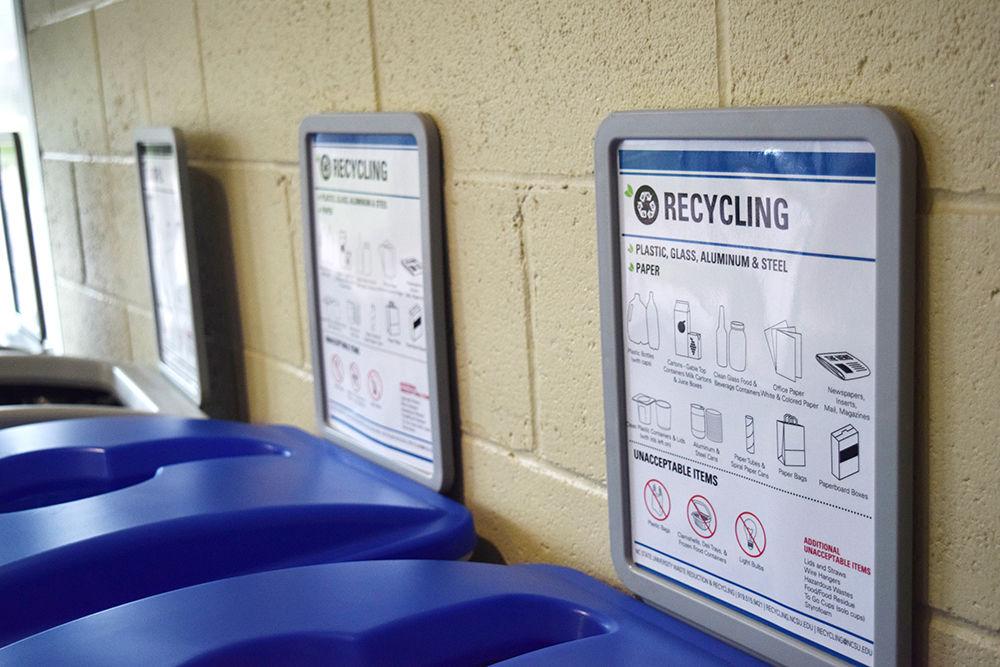
Elijah Moracco-Schelp
New waste and composts bins can be found in Talley Student Union and Witherspoon Student Center, brought in by the Sustainability Council at NC State. The organization exists to reduce waste and advance sustainability on campus.
New composting and waste bins placed in Talley Student Union and Witherspoon Student Center have an impact on reducing NC State’s waste in the last two months by saving waste from sitting in landfill streams and impacting the landscape in a negative way.
The new waste bins were first placed in Talley because the vast amount of people that come and go through that building on any given day. Nessa Stone, the operations manager for Waste Reduction and Recycling, was the one who initially placed these bins in Talley to begin the project.
“Talley is kind of like a flagship building for campus standards for a building, design and construction.” Stone said. “I think the implementation there first is important, and it touches so many people on a daily basis. The next progression was to move the program to Witherspoon and help them update their bin standards to include the composting.”
Part of the strategic plan for the University is to expand composting on campus. Trying to find the most cost effective and strategic locations around campus to implement is important to the Office of Waste Reduction and Recycling.
Adam Bensley, the waste diversion coordinator for Waste Reduction and Recycling, works alongside Stone to implement the new waste bins around campus.
“At Talley things are going great,” Bensley said. “One of the reasons that things are so successful at Talley and that it is now moving to Witherspoon is that we have a lot of support from campus enterprises, TJ Willis especially. He’s a real champion for waste diversion and kind of oversees Talley and Witherspoon for certain aspects of it. If the program is to successfully work in Talley, then it can work in other, less visited locations as well.”
The project originated in 2009 in dining halls, like Fountain, Clark and Case, due to their excessive food waste from food preparation and uneaten food.
“Dining halls were a huge proponent when the programs first started to reduce their waste and create a composting program around their needs and it’s expanded through interaction with students and faculty and staff,” Stone said.
More recently, Stone added composting bins to restrooms for the paper towels to be put in.
“The restroom composting of paper towels is a great way to introduce composting to people who may have not of experienced composting in their daily lives,” Stone said.
Since adding the restroom composting, the waste collection has expanded in the last two months alone from being picked up on Mondays, Wednesdays and Fridays to being collected up to six days a week. This has doubled the compost pickup for Talley alone. Students have done a better job at being cautious with what they are throwing away thanks to the new waste bins that have signage informing students and staff where the waste is going.
Waste Reduction and Recycling, essentially recycling organic waste, is going even further than just recycling the waste that they gather to compost.
“The compost process is actually turned back into soil amendments and reused on campus,” Stone said. “That material is actually finding another purpose, which is a different step in the recycling process.”
Bensley also commented on how composting is a positive alternative to landfill waste.
“In the landfill, it just sits there,” Bensley said. “It’ll breakdown and produce methane gas and is always there. With composting, it gets a second life and is a really, really important soil amendment. We use it in flower beds, landscape like Court of [North] Carolina and the turf grass as well.”
Because of student support, composting efforts are aiming to expand across NC State to areas such as residence halls in the near future. Waste Reduction and Recycling wants students to have the best recycling options to have better accessibility and expand waste reduction options across campus.